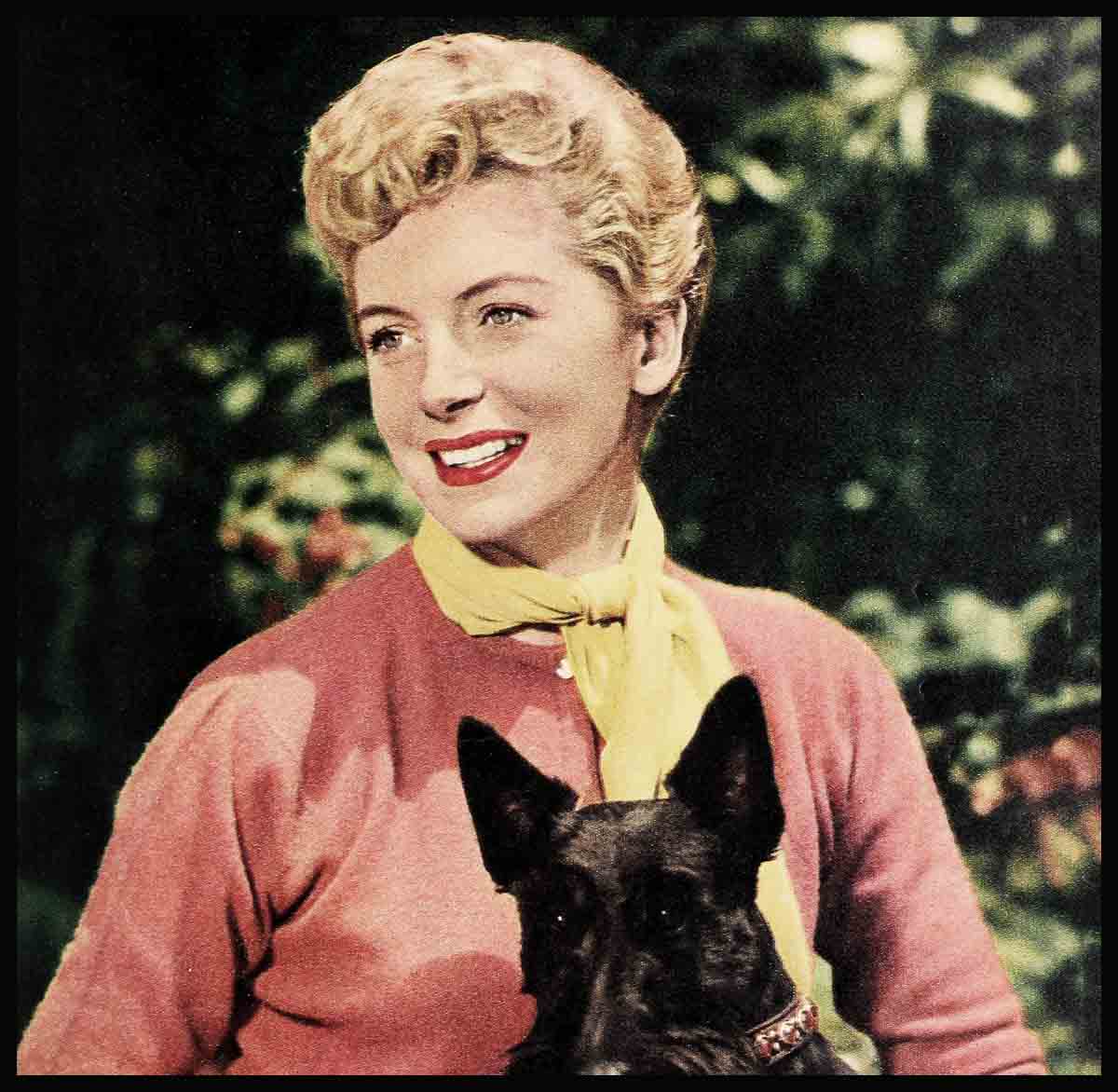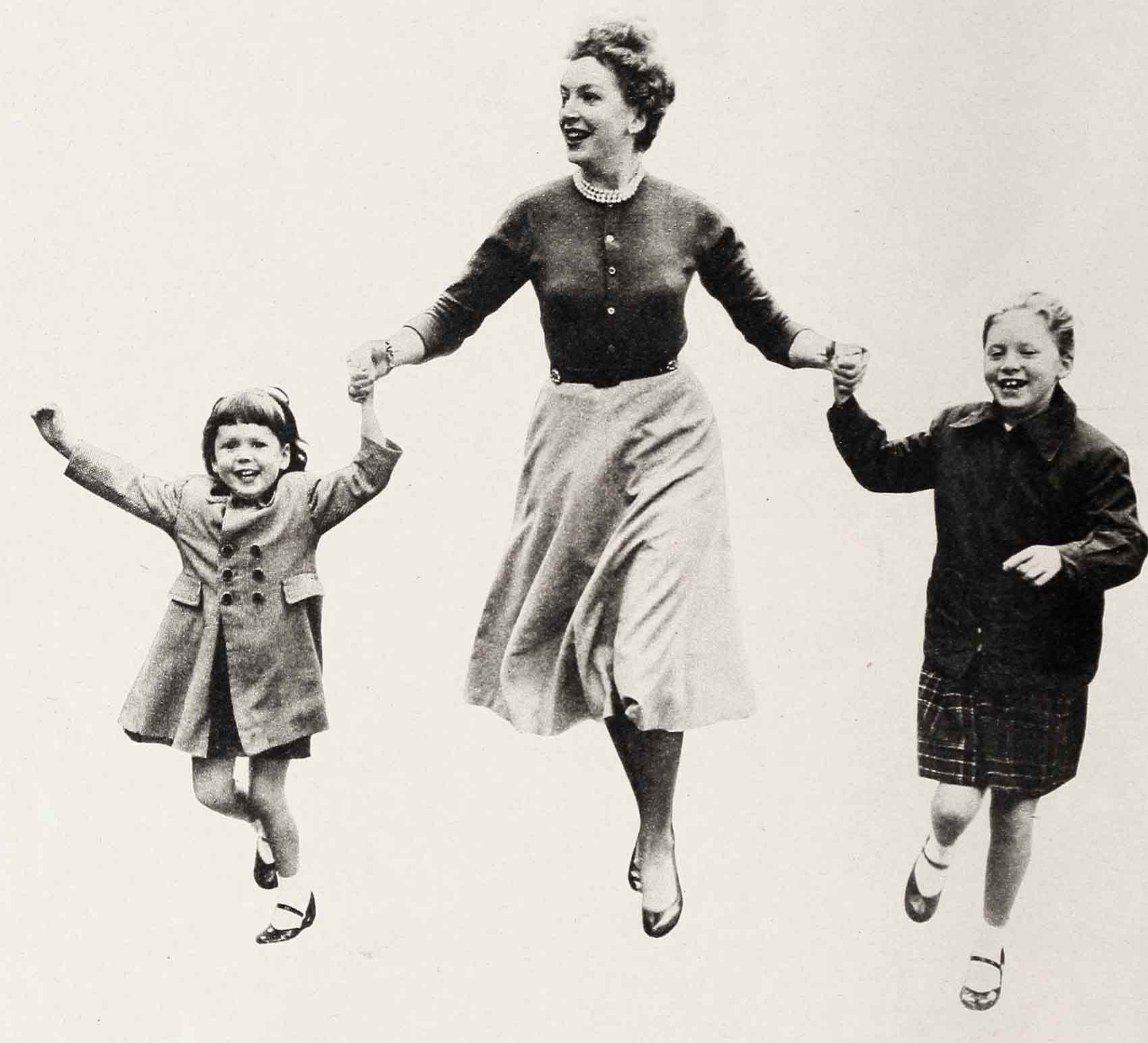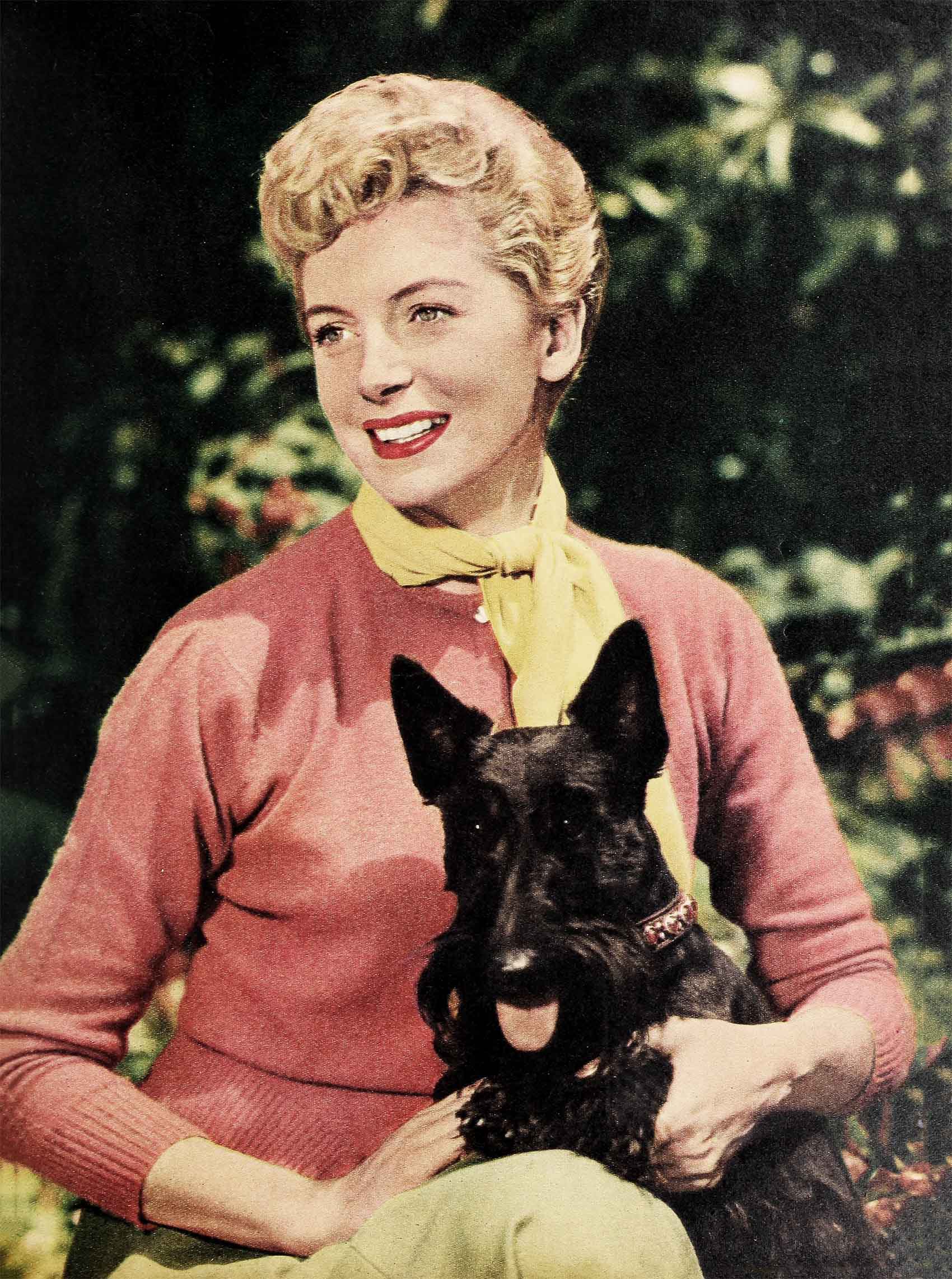
Deborah Kerr’s Story
Deborah Kerr was eight when her father died, and a few months later she was placed in a very correct—very cold—boarding school. And Deborah felt as if she’d lost her mother, too. That’s when she first knew how lonely a child can be. The loneliness stayed with her, through adolescence and after she had become a woman.
Then one day during the war, while she was on an Armed Service Forces entertainment tour, she walked into a pub in Brussels.
A tall, blond, handsome flyer was sitting there, staring into his drink. She was introduced to him. They shook hands, sat down together, began to talk. His name was Lt. Tony Bartley. He said he’d like to whizz her around the city in his jeep. And she took him up on it.
They fell in love.
Then he was sent to another theatre of operations. Deborah was heartbroken, and lonely again.
Until one night when she received a cable, Will You Marry Me? She replied with no trace of coyness, Yes. Where And When? The answer was a wedding in London on November 28, 1945.
That was eleven years ago, and since then Deborah has never felt that old ache of loneliness, not even when she and her husband are apart, separated because of their work. Their marriage is rock-solid.
There were a couple of other blessings too: her career zipped her to the top of the heap, and she and Tony had two adorable girls, Melanie and Francesca.
God’s in his heaven, all’s right with the world, and life for Deborah was just a bowl of cherries.
Until one day when Deborah heard a neighbor tell Melanie how lucky she was to have a movie star for a mother. “I guess so,” Deborah overheard her child answer, “but this is the first time I’ve seen Mother in three months.”
Deborah stood there, shocked into the past. Suddenly she was reliving a time she hadn’t thought of for twenty years, a time from her own childhood when she lay on starched sheets at night and heard the soft breathing of her sleeping school-mates—while she tried to smother her own sobs of loneliness in the soft pillow.
And the days when Deborah had sat in classes, listening to the teacher who looked just a little like her mother, and wanted—with a want that really made her heart hurt—to feel soft protecting arms holding her . . . and brushing away her tears a light kiss that said everything’s all right; Mummie is here.
This was what Melanie was feeling? Her child? Then Deborah was a failure!

A terrible fear
She walked over to the little girl she loved with all her heart, whose happiness was her own happiness—whose tears were her tears. She cradled a surprised Melanie in her arms and whispered, “Everything will be all right, darling. Mummie’s here.”
But she felt a terrible fear. Would everything be all right? Could she be a good mother, the kind of mother that a child had the right to have? A mother plus a wife—plus an actress?
When Melanie darted away, eagerly following a bright butterfly that skipped from flower to flower, Deborah made a solemn vow: I’ll have to remember how it is to be a little girl, Melanie; I’ll have to remember you’re too young to understand that even if we’re not around—the people who love you are still with you.
One day, weeks later, she sat reading the new script that had just been sent to her by the studio. All of a sudden her mind started racing and the words on the page were blotted out. Would she have to choose?Could that ever happen, a day when she would realize that she had to choose between the work she loved—and her children? No . . .
Deborah closed the script, turned out the reading lamp and sat in the twilight filtering through the window. Her head went back against the chair and she closed her eyes. She tried to picture what it would be like without the excitement of studying a new role, learning to live the part, to feel it, to get it across. To create.

Happiness for all of them
Then the door flew open and a small cyclone plumped itself down on Deborah’s. lap. “Help me with my ’rithmetic, Mummie,” Melanie begged.
“Don’t you think it would be better if you tried to figure it out yourself?” Deborah asked. Only the asking sounded more like a wail, because wrestling with Melanie’s arithmetic problems is just about the only maternal chore that really bugs Deborah.
“No, Mummie, I think it would be better if you helped me,” Melanie answered her mother, most emphatically.
So Deborah looked at it a bit, figured out what the trouble was—and calmly crossed off a couple of spare zeros that she didn’t know what to do with!
“That’s not the way my teacher does it,” objected Melanie.
“Well,” snapped her mother in one of her rare flare-ups, “you tell your teacher I said he’s crazy!” Then, reconsidering, she added, “Well, perhaps you’d better not,” and she swept the script off the table to spread out the math books and concentrate on the brain-teaser in comfort.
A quarter hour later, after much head scratching and pencil chewing, Deborah came up with an answer that her daughter was willing to settle for. Melanie trotted off to finish her homework, and again Deborah was alone in the quiet room. She stooped to pick up the script lying on the floor, and—almost as if there were two Deborahs sitting there, one of them listening and the other speaking—she heard herself say, “Of course there’s no choice.” That moment she knew that she could never just muddle along and take everything she wanted out of life . . . and do only a half-job if she didn’t have time to do everything right. Not where her children were involved. If she had to choose, she knew where her choice lay—because Deborah knew what was really important to her . . . to keep loneliness from two little balls of fluff whose arms around her neck spelled happiness—for all of them.
An important choice
She knew that the next months would tell her whether or not a choice would have to be made. Whether or not she could give of herself to the work she loved—without taking from her family. The next months of working on Heaven Knows, Mr. Allison would tell her if she could be an actress, without condemning her daughters to the kind of emptiness that her own childhood had held for her.
The months sped by . . .
It was almost Christmas. Shooting was finished, and Bob and Dorothy Mitchum talked Deborah and Tony into celebrating with them in New Orleans. “I’ll show you New Orleans like you’ll never see it with anybody else,” Bob wheedled. “It’s his favorite city,” Dorothy laughed, “so he probably could, too!”
The weeks of working had taken their toll. Deborah felt as exhausted as she’d ever felt in her life. Days of vacationing in a strange city as exciting as New Orleans, days of forgetting everything except resting and having fun with Tony and the Mitchums sounded like just the
kind of escape she needed to unwind from the tensions of living a role. She looked at Tony, saw the eyebrows go up in that way that means anything you’d like is fine with me—and felt her tight nerves begin to relax. “We’ll go!”
And hours later they were on their way.
They were in New Orleans just one day. Just long enough to have New Orleans coffee and doughnuts in the one place that Bob Mitchum said was the only place in the world where they made the coffee just like it should be, with just the right amount of cinnamon—just long enough to taste shrimps prepared like Deborah had never tasted before—just long enough to catch a glimpse of the French quarter and insist to Tony and Bob and Dorothy, “I know I’m going to find something fabulous in one of those tiny little shops, and I’m going to go into every one of them before we leave!” Just one day, and she was telling Tony, “I’m beginning to feel myself unwind enough to think maybe I’ll live. Even for the re-shooting on the picture!”
Then the telegram came: Melanie was to perform in a holiday play at her school the next afternoon. Could Mummie come?
Deborah knew how much she needed the relaxation that New Orleans held out to her; she had worked hard. What difference could it make to Melanie whether or not Mummie was at the play—there’d be plenty of others to applaud her. The children were well taken care of; their nurse loved them—Deborah had been home just the week before; they wanted for nothing. Tony didn’t say anything. This was something that Deborah had to work out.
She sat in their hotel room, thinking of all the plans the four of them had made for the next days, thinking how wonderful it felt to be away from everything except fun. And thinking how lost a little girl can feel if she feels she’s alone, even if she isn’t—but just feeling that way . . .
Then she looked up at Tony. “Make the reservations, darling. And tell Bob and Dorothy. I’ll pack,” she said wistfully.
They took the next plane out, and Deborah was on hand to cheer Melanie in her dramatic debut.
Melanie shows her the way
As they drove home from school Melanie was a little chatterbox, telling her mother about all the things that almost made the play a flop, what with the ten-year-old leading man being temperamental and the scenery taking longer to finish and, and, and.
Deborah looked at her daughter and smiled. “Why, you didn’t even have time to miss me,” she joked. “Even if I hadn’t been away, I’ll bet you wouldn’t have had time to even see me, what with all that going on!” Just so her mother’s feeling wouldn’t be hurt, Melanie generously explained, “Oh, I don’t mind having you around when I don’t need you!”
Then Melanie looked up at her mother, her eyes very serious, and explained, “You see, Mummie, if you’re not here it doesn’t matter too much—just as long as I know you’ll come when I have to have you.”
A smile played on Tony’s lips, but he kept his eyes glued to the road ahead. Deborah hugged her child to her; here was the answer.
She would not have to choose!
Her children knew that every cry in the night would be answered—be the cry foolishness or not. And knowing that, their mummie could be away from them and she would still be with them . . . always.
Eleven years ago Deborah learned to be happy without loneliness. Now she’s learned to give to the very little ones the same fulfillment that a gentle man had brought her when he showed her a love without fear. And she’s teaching her children what she herself had never known—how to be alone, and know that you are notalone . . .
THE END
Deborah can currently be seen in 20th Century-Fox’s Heaven Knows, Mr. Allison. Watch for her soon in U.A.’sSeparate Tables, 20th’s An Affair To Remember and Otto Preminger’s Columbia release Bonjour Tristesse.
It is a quote. MODERN SCREEN MAGAZINE MAY 1957




